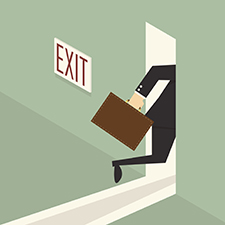 Giving your resignation to your boss is never an easy thing to do.
Giving your resignation to your boss is never an easy thing to do.
You may not get along with your boss or you may dislike your job, but it’s still important to quit your job professionally and with tact. If you’re preparing to resign from a job, plan it out and handle it as carefully as you would any other business decision. Don’t burn your bridges, because you never know when a former employer will come in handy for as an ever-important reference.
If you are absolutely certain that it’s time for you to resign from your job, here are some tips to make quitting a little easier and more professional.
Always give notice.
Chances are, your employee handbook spells out how much notice you should give. If it does, then abide by it or offer at least two weeks of notice. If you absolutely cannot stay a minute longer, here are some acceptable reasons for not giving notice.
Stick to your guns.
Sometimes, your boss might ask you to stay a little longer than two weeks. You have no obligation to stay, but the decision is ultimately up to you. Offer to help your previous employer by training someone during your two weeks or answering questions that may be emailed to you in the coming weeks.
Write a formal resignation letter.
Be professional in the letter, submit it, and tell your immediate supervisors about your decision. Need tips on how to write a resignation letter? Check out these tips.
Keep it short and sweet.
Emphasize the positive things you gained at the company, but be firm about your decision to leave. Offer to help during the transition, and try to keep negativity out of the letter. You may have great reasons for leaving, but there’s no point in hashing it out – you’re leaving anyway, so make sure you leave on good terms.
Ask for a reference.
Always ask for a written letter of recommendation for future employers.
The devil is in the details.
Before leaving, get your employee benefits, unused vacation, sick pay, and retirement funds all in order. Some great tips about employee benefits are available here.
Don’t take what doesn’t belong to you.
Sure, this may seem like common sense, but even your email list might fall under this category. Before you leave, return important documents, property like cell phones, keys, and anything else that you didn’t personally buy.
Stay present.
It’s easy to check out that final week of work, but keep doing your best. Being professional up to the very end will pay off.
Leaving a job and turning in a resignation is a stressful transition. Take time to decompress and renew your spirit to make sure you have the right state of mind to hit the ground running at your new job.
Have you ever resigned from your job? How did you handle it? Share with us in the comments section below.
Movin’ On Up is brought to you by Express Employment Professionals.
